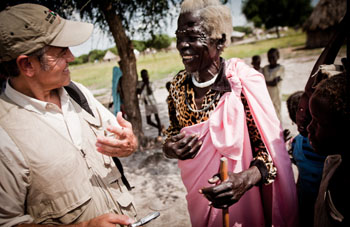
A “21st century statesman” is what Newsweek is calling actor George Clooney for his long-standing efforts to push for high political engagement in Sudan—the most recent of which was detailed in the magazine’s cover story this week.
The piece chronicles Clooney and Enough Co-founder John Prendergast’s latest trip to South Sudan during the momentous vote for secession—from the capital of Juba, to the volatile border region of Abyei, to Mejak Manyore, a returnee camp—all the while asking the question: Does having a celebrity advocate make a difference?
Here’s an excerpt in which writer John Avlon offers one answer:
South Sudan’s January referendum for independence was quickly followed by uprisings that toppled North African and Arab dictatorships, with power moving away from centralized political bureaucracies and toward broader popular engagement. In this new environment—fueled by social networking—fame is a potent commodity that can have more influence on public debate than many elected officials and even some nation-states. “It’s harder for authoritarian regimes to survive, because we can circumvent old structures with cell phones and the Internet,” says Clooney. “Celebrity can help focus news media where they have abdicated their responsibility. We can’t make policy, but we can ‘encourage’ politicians more than ever before.” Which was why, a few weeks ago, Clooney was being driven in a white pickup down a red dirt road under the watchful eyes of teenage soldiers armed with AK-47s. L.A. was half a world away, but the paparazzi were not far from his mind. “If they’re going to follow me anyway,” he was saying, “I want them to follow me here.”
There remain many detractors and admirers of Clooney’s efforts on Sudan, but Avlon makes the strong argument that a celebrity voice will significantly drive media attention. “Between October and January, the referendum was mentioned in 96 stories across the networks and cable news—with Clooney used as a hook one third of the time,” Avlon writes. How policy-makers respond to that media attention, of course, is as Clooney said himself, another matter.

